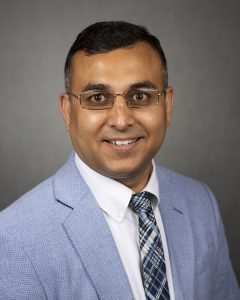Dr. Lakesh Sharma has joined the UF/IFAS Soil and Water Sciences Department as an Assistant Professor of Soil Fertility and Sustainable Nutrient Management. We asked him to tell us about his background and future plans.
What are your research interests?
My experiences are in soil fertility issues, soil tillage study, slow-release nitrogen fertilizers, a ground-based active optical sensor for in-season nitrogen recommendations, site-specific farming, and economic-based fertilizer recommendations. My focus area is to revise and refine Best Management Practices (BMP) using the above technical skills. My goal is to educate agriculture stakeholders and growers about BMP.

I plan to develop sustainable agriculture systems, the site-specific farming system with multiple cropping systems, crop models for economic fertilizer recommendations for growers, sensor-based, in-season nitrogen recommendations, and minimum tillage cultivation. There is a strong need to develop economic-based nutrient recommendation in Florida with the emphasis of sustainable environmental practices. The use of appropriate fertilizer, a minimum tillage program, the development of in-season nutrient application rates, and selection of appropriate rotational crops are on top of my agenda.
Nutrient management is critical in an intensive agriculture production system. Growers frequently over-fertilize their crops because they can easily see the nutrient response on the crop. However, this over-fertilizing can lead to uneconomical and environmental pollutant practices. A good idea to feed the crop is on a need basis approach that will save money and the environment. At planting, a high nutrient application might result in large leaching and volatilization issues. In North Dakota, my study for N rate, under high clay soils, explained that 1600 pounds/acre of nitrogen was required to have optimum corn yield when the soils were wet. However, in Florida, leaching and volatilization could be an issue due to variable soil textures around the major area of agriculture production.
Cultivation systems, previous crops, and soil types all may affect overall nutrient requirement by the crop. It is important to rotate crops to suppress the disease and insect pest attacks. Fertilizer selection is a big challenge for growers since there are many new, expensive fertilizers launched every year. Slow-release fertilizer could be a wise choice with some knowledge on how much nitrogen is water-soluble, slowly released, and water-insoluble. Readily available side-dress application with urea could be a sensible practice. Soil pH management is an important soil parameter that drives the availability of all major and minor nutrient in the soil.
What prompted you to apply for this job with UF/IFAS Soil and Water Sciences?
The major reason for my application to UF was the compatibility of my research and extension skills to the position I am at present. It was the perfect match of what my goal was at UMaine Cooperative Extension.
What is your vision for your research and Extension programs?
I want to be the leader of BMP in the state and national level both in Extension and research.
What do you foresee as being the biggest challenge ahead?
Learning Florida agriculture system and improving a farmer’s techniques to make them environmental-friendly without compromising the net dollar income.
What motivates you most to go to work every day?
The little step that I take every day to achieve my bigger goal.
 0
0
